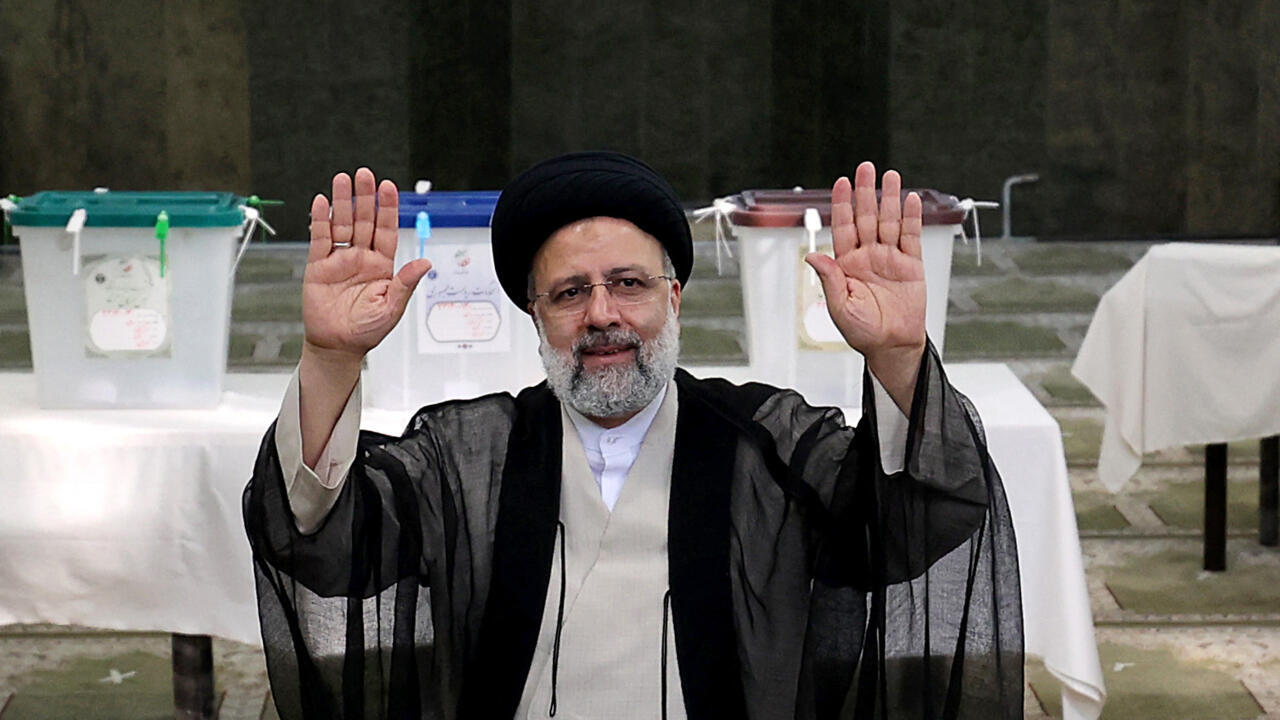
Ultraconservative Ebrahim Raisi succeeds reformist Rouhani as Iran’s president
Issued on:
Ultraconservative cleric Ebrahim Raisi has been elected Iran’s new president with more than 61.95 percent of the vote, Interior Minister Aboldreza Rahmani Fazli announced on Saturday. Voter turnout was estimated at 48.8%, the lowest ever recorded for a presidential election after reformists called for a boycott.
Ultraconservative Ebrahim Raisi unsuccessfully challenged moderate reformist President Hassan Rouhani in the 2017 elections but proved victorious this time, with Rouhani ineligible to run for a third term. Raisi will take over from Rouhani in August.
Raisi is a trusted confidant of Supreme Leader Ayatollah Ali Khamenei, who was one of his seminary instructors. Raisa is not an ayatollah but a Hujjat al-Islam, a lower rank of the Shiite clergy, and is also a sayyid – considered a descendant of the Prophet Mohammed in Shiite Islam. This entitles him to wear the black turban, a distinction among the pious.

Like the supreme leader, Raisi comes from the holy city of Mashhad in northeast Iran. In 2016 Khamenei appointed him to head the powerful religious foundation Astan Quds Razavi, which manages the shrine of Imam Reza in Mashhad. This major Shiite pilgrimage site attracts billions of euros in donations controlled by Astan Quds Razavi. The foundation, which functions as both a charity and a holding company, owns a multitude of real estate properties, farmland and businesses in fields as diverse as construction, tourism, agriculture and food.
Raisi ran the foundation for three years before Khamenei appointed him to head the Iranian judicial authority in March 2019, tasked with aggressively fighting corruption.
As Khamenei’s loyal soldier, Raisi has expanded the number of widely publicised corruption trials, at times targeting state dignitaries and also, on occasion, judges themselves.
These trials have also allowed him to oust political opponents, such as his predecessor at the head of the judiciary, Sadeq Larijani, whose close adviser was embroiled in one of these corruption scandals. Larijani is also the brother of Ali Larijani, whose candidacy for the 2021 presidential election was banned by the Guardian Council.
Raisi fits Khamenei vision of ‘young, pious’ Iranian govt, says Atlantic Council’s Holly Dagres

Raisi made the fight against corruption one of his central campaign slogans, presenting himself as “the opponent of corruption, inefficiency and aristocracy”. He has also promised to fight relentlessly “against poverty”.
But Raisi’s name causes anxiety among human rights organisations and the Iranian diaspora.
As a member of the judiciary for more than two decades, including as deputy prosecutor of the Tehran revolutionary court in the late 1980s, he served as a judge in a series of political trials in 1988. By the end, hundreds of imprisoned opponents had been executed. Raisa’s critics still reproach him for his role in the executions today, but his past gives him legitimacy in the eyes of Iran’s powerful conservative population.
Successor to the ayatollah?
With Iran still struggling under economic sanctions imposed by the West, Raisi is not expected to advocate opening up the Iranian economy to foreign investors. “Iran under Raisi is most likely to continue to invest in infrastructure, water, electricity and health, with an economy dominated by the foundations he knows well and the Revolutionary Guards (who also own many companies),” said economist and Iran specialist Thierry Coville in an interview earlier this month.
Researchers estimate that these semi-public financial interests currently represent more than 50 percent of the Iranian economy, but the phenomenon remains difficult to quantify because such companies do not have “clear traceability” and operate in a system that protects them.
As for the Iranian nuclear agreement currently being renegotiated, although Raisi strikes a defiant tone towards the West he is not expected to be explicitly opposed to it, according to Coville, who noted that it is the supreme leader “who sets the tone for these negotiations”.
Raisi has the support of the hardliners on the morality questions Iran is grappling with. His father-in-law is none other than Ayatollah Ahmad Alamolhoda, the supreme leader’s representative in the northeastern province of Khorasan. Known for his austerity, Alamolhoda distinguished himself in 2016 by banning concerts in the city of Mashhad even as musical events had been experiencing a resurgence in other major cities of a modernising Iran.
Raisa has even been considered a likely successor to the supreme leader. He was recently elected vice president of the Assembly of Experts, the body responsible for selecting a new supreme leader in the event of Khamenei’s death. And Khamenei, now 82, was himself president of Iran when he was asked to serve as supreme leader in 1989 after the death of Ayatollah Khomeini.
Given Khamenei’s advanced age, a presidential victory could serve as Raisi’s springboard to the position of supreme leader.
This article has been translated from the original in French
Stay connected with us on social media platform for instant update click here to join our Twitter, & Facebook
We are now on Telegram. Click here to join our channel (@TechiUpdate) and stay updated with the latest Technology headlines.
For all the latest Health News Click Here
For the latest news and updates, follow us on Google News.

